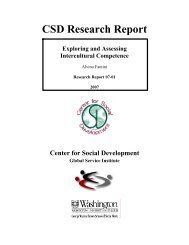Rediscovering social investment in developmental welfare state ...
Rediscovering social investment in developmental welfare state ...
Rediscovering social investment in developmental welfare state ...
Create successful ePaper yourself
Turn your PDF publications into a flip-book with our unique Google optimized e-Paper software.
R E D I S C O V E R I N G S O C I A L I N V E S T M E N T I N D E V E L O P M E N T A L W E L F A R E S T A T E P O L I C I E S :<br />
B A C K T O T H E F U T U R E<br />
<strong>welfare</strong> <strong>state</strong>, (3) <strong>welfare</strong> <strong>state</strong> research has evolved over time <strong>in</strong> terms of the approach to effort and<br />
outcomes and <strong>in</strong> response to chang<strong>in</strong>g historical circumstances, (4) there are select research f<strong>in</strong>d<strong>in</strong>gs<br />
that underlie the possibility of simultaneously protective and productive <strong>social</strong> policy, and (5) there<br />
rema<strong>in</strong> several metatheoretical concerns that have <strong>in</strong>hibited conceptual progress on understand<strong>in</strong>g<br />
the potentially productive effects of <strong>social</strong> policy. While it not necessary to discuss po<strong>in</strong>ts 1 and 2 <strong>in</strong><br />
this paper, I will briefly discuss po<strong>in</strong>ts 3, 4, and 5.<br />
While it is impossible <strong>in</strong> this paper to delve <strong>in</strong>to the various pressures fac<strong>in</strong>g <strong>welfare</strong> <strong>state</strong>s or the<br />
def<strong>in</strong>itional ambiguity referred to as the dependent variable problem us<strong>in</strong>g the metaphor of generations<br />
(Esp<strong>in</strong>g-Andersen, 1989, 1990; Mäk<strong>in</strong>en, 1999), it is possible to briefly classify major studies <strong>in</strong> the<br />
comparative <strong>welfare</strong> <strong>state</strong> literature. Follow<strong>in</strong>g Kvist and Torf<strong>in</strong>g (1996), the first generation can be<br />
characterized as focused on the emergence and growth of the <strong>welfare</strong> <strong>state</strong>, the second as describ<strong>in</strong>g<br />
dissimilarities between <strong>welfare</strong> <strong>state</strong>s, and the third as emphasiz<strong>in</strong>g the <strong>welfare</strong> mix and focus<strong>in</strong>g<br />
more explicitly on the outcomes of <strong>welfare</strong> <strong>state</strong>s (Table 1). Among the <strong>in</strong>novations has been a<br />
move away from us<strong>in</strong>g crude public expenditure measures to describe <strong>welfare</strong> <strong>state</strong>s‘ efforts toward<br />
typologies of <strong>welfare</strong> regimes, and from exam<strong>in</strong><strong>in</strong>g <strong>in</strong>come-based measures of poverty and <strong>in</strong>equality<br />
as the ma<strong>in</strong> effects of <strong>welfare</strong> <strong>state</strong>s toward a focus on broader notions of deprivation. However,<br />
while we know much about the effects of the <strong>welfare</strong> <strong>state</strong> on poverty rates, <strong>social</strong> rights and <strong>in</strong>come<br />
<strong>in</strong>equality, advances beyond the third generation have been slowed by fail<strong>in</strong>g to fully consider how<br />
potentially productive outcomes of the <strong>welfare</strong> <strong>state</strong> are related to the level and type of <strong>welfare</strong><br />
effort.<br />
Table 1. The Generations of Welfare State Research<br />
Generation Central research focus<br />
First<br />
Second<br />
Third<br />
Fourth?<br />
Indicators of <strong>in</strong>dustrialism, role of the <strong>state</strong>, and political power used to predict <strong>welfare</strong><br />
<strong>state</strong> expansion based on aggregate <strong>social</strong> expenditure<br />
Challenges the validity of aggregate-expenditure measures <strong>in</strong> favor of structural and<br />
<strong>in</strong>stitutional features such as the policy or benefit design and delivery system; largely<br />
cont<strong>in</strong>ues focus on <strong>welfare</strong> <strong>state</strong> expansion (or retrenchment) but also beg<strong>in</strong>s to<br />
exam<strong>in</strong>e poverty and <strong>in</strong>equality<br />
Explicit shift toward exam<strong>in</strong><strong>in</strong>g the results that the different regimes have produced <strong>in</strong><br />
terms of poverty rates, <strong>social</strong> rights and <strong>in</strong>come equality us<strong>in</strong>g both expenditure levels<br />
and eligibility rules; focus is on outcomes not <strong>welfare</strong> effort per se 9<br />
Studies focus on a wide range of well-be<strong>in</strong>g related outcomes beyond economic wellbe<strong>in</strong>g<br />
and that may have productive implications beyond distribution; it is not at all<br />
clear how the theoretical possibility of productive outcomes relates to the way that one<br />
th<strong>in</strong>ks about the extensive array of categories of <strong>welfare</strong> <strong>state</strong> effort<br />
Advances <strong>in</strong> scholarship have been driven by several factors, among them the chang<strong>in</strong>g conditions<br />
confront<strong>in</strong>g the <strong>welfare</strong> <strong>state</strong>. Dur<strong>in</strong>g the rapid expansion of <strong>welfare</strong> <strong>state</strong> programs, scholarly<br />
9 Among the <strong>in</strong>creas<strong>in</strong>gly pluralistic focus of this generation, particular attention has been paid to questions of <strong>in</strong>equality<br />
among specific groups (e.g., women) and the impact of gender on <strong>welfare</strong> benefits, labor market participation, earn<strong>in</strong>gs,<br />
and the like.<br />
C E N T E R F O R S O C I A L D E V E L O P M E N T<br />
W A S H I N G T O N U N I V E R S I T Y I N S T . L O U I S<br />
7
















